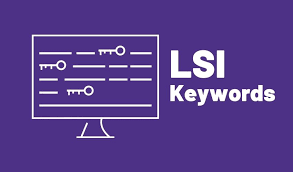
Table of Contents
What Are LSI Keywords?
In a simple definition for SEO, LSI keywords can be thought of as search terms related to the main keyword that a user types into a query. These keywords help to support content by adding more context to make it easier for search engines to identify what the content is about and feed accurate results to queries and user intent. LSI keywords go beyond synonyms and semantically related words to include user intent.
For example, take the query typed into Google’s search bar Hotdog. LSI keywords would include hotdog stand, hotdog eating contest, franks, hotdog buns, ketchup, and so forth. All kinds of words that relate to hotdogs and what a user might want with hotdogs.
What Does LSI Do?
Latent Semantic Indexing (LSI), or Latent Semantic Analysis (LSA), is a natural-language processing technique developed in the 1980s. It’s a technical and mathematical technology in its functioning. It was created to help connect search keywords with related topics. While this might seem very simple and straightforward, it both is and is not at the same time. What do we mean by that? The words a user chooses to search with are often not the same ones that a content creator may have used. Many times synonyms are substituted. This could confuse an overly simplistic search engine and provide irrelevant search results.
For example, if a user wants to buy a new car and enters the word car into a search engine, prior to LSI he would only see results that have the keywords car in them. Any content that exclusively used the synonym, automobile, would be left out.
In a second example, if a user types Ragtime into a query, she might get results for the musical style, ragtime, but it could also become a bit confusing with a primitive search engine returning disparate results about rags and the concept of time.
Another issue pre-LSI is that of polysemic words and phrases. Polysemic instances use the same word with multiple meanings. For example: chair, which could mean a seat or a person who heads a committee. Another example is the word: dim, which could mean low light or a lack of intelligence in a person.
Search engines that cannot understand user intent and deliver inaccurate results because of linguistic semantics will find themselves obsolete as frustrated users jump ship.
LSI has helped solve this problem by grouping related words and phrases together so that search engines can recognize them as having relationships to one another.
How Does LSI Work?
A computer cannot make connections or correlations between words or phrases without being told. LSI informs computers of semantic connections by using complex mathematical equations to derive the relationships between words from a predetermined set of documents that contain relevant information.
LSI is used to make connections between individual concepts or words and phrases within a document. Taking fall (the season) as an example, we can easily understand that fall is a synonym for autumn. In addition there are phrases and other words that while not synonyms, are related to the concept of fall. These include spring, summer, winter, the 4 seasons, and so forth, and are of semantic relation. The same could be done with the idea of cars. There are the synonyms: automobiles, vehicles, and so forth, and there are also semantically related words such as race car, truck, SUV, tires, road, etc.
Once these connections can be made, search becomes much more accurate and is not only focused on single words, but on finding connections between words to enable a more accurate idea of the user’s intent with the search.
Is Google Using LSI?
Google says it does not use LSI. But it certainly has the ability to make correlations between words and phrases. However, because LSI is an old technology— remember it was developed in the ‘80s— Google has since developed a better and more scalable technology to tackle semantics in search.
According to Bill Slawski, author of SEO by the Sea blog, “Google does attempt to index synonyms and other meanings for words. But it isn’t using LSI technology to do that. Calling it LSI is misleading people. Google has been offering synonym substitutions and query refinements based upon synonyms since at least 2003, but that doesn’t mean that they are using LSI. It would be like saying that you are using a smart telegraph device to connect to the mobile web.”
So it seems that LSI is not being used at Google, but a newer technology that accomplishes similar goals has replaced LSI. But this doesn’t mean that the concept of LSI keywords is irrelevant.
The concept of LSI keywords is still relevant for ranking on search engines, as it solves the same problem that Google’s technology does. Using some related words and phrases in your content can almost certainly help improve SEO.
How Do LSI Keywords Help With SEO?
LSI keywords certainly help to improve ranking in search engines in the following ways:
- Using LSI keywords enables Google to understand the website, and its function or service. This means that it will rank better and can work with user intent.
- Related keywords help increase visibility and although a searcher might be looking for a new car and type in automobile, LSI keywords will ensure that related sites populate the search results page.
- LSI keywords provide a better experience for users because they create results that are more accurate. This means that when a user clicks into a suggested site, they will likely stay longer and interact more, improving a site’s ranking.
- Semantic LSI keywords help search engines know that a site is legitimate and not simply a site using keyword stuffing.
How to Determine the Right LSI Keywords
So how do you pick the right keywords for your website and for the content generated for your business? First off, find 5-10 primary keywords that describe your services. Next find related keywords (synonyms and semantic relations). These will be your LSI keywords. The following are ways to find the keywords that will boost your SEO ranking.
1. Use Autofill in the Search Bar
This is the easiest way to find keywords that relate to your main one. Begin typing your target keyword into Google’s or any other search engine’s search box and you will get a variety of optional words to complete the phrase. These are LSI keywords.
2. Related Searches
If you scroll down to the bottom of a search results page, you’ll see the “Related Searches” section. This is a great spot to find more ideas of potential LSI-related keywords to incorporate into your content.
3. LSI Graph and Serpstat
You can also use a simple tool such as LSI Graph, a free LSI keyword generator that suggests terms related to your primary keyword. Simply type in a main keyword and you’ll get a list of LSI terms.
Serpstat is another such tool that helps find semantically related phrases for keywords. Enter the primary keyword, select SEO Research > Related Keywords and you’ll receive a list of words and phrases relating to your main keyword.
Once you’ve received a list of keywords and their related keywords, you can begin to incorporate them into your business’ content to enhance SEO results. Here’s how to go about it for maximum results.
How to Add LSI Keywords to Your Content
LSI keywords should show up in the same places as the main keyword(s). Important areas included the following:
- Meta title and description
- Headings (H1, H2, H3)
- Image alt tags
- Within the body of the text
The related words should seem natural and organic in appearance. They relate to the keyword and oftentimes can work as a synonym for the keyword so that Google doesn’t think you’re using keyword stuffing, but understands that you have an actual user in mind.
That said, you won’t want to overuse LSI keywords in your content. While they may be synonyms, it’s still easy to repeat and overuse these as well. If you do, you may very well be penalized for it. You want to include enough related words to make the object and the content of your page clear to Google and other search engines, but not so many that it appears as keyword stuffing.
To create highly visible and valuable content, add related keywords when possible and necessary but continue to keep the focus on the user’s experience and his/her intent. Easy to read content that offers expert advice or information and has a natural flow is ideal. Following this format will help increase your SEO rankings and visibility while improving your user experience. This will help your business generate income from its content.
If you’d like to reevaluate your SEO strategy or digital marketing strategy to make sure you’re effectively using LSI keywords, Pixel506 can help.
About Pixel506
If you're looking for a nearshore SEO or Digital Marketing partner with software development services, or a technical staff augmentation service, Pixel506 can help. We are located in Costa Rica but also have Pixelians (team members) based in Peru, Nicaragua, and Colombia. We help businesses gain a competitive advantage and exceed business goals through software development services, design, user experience strategies, data, and innovative solutions. Founded in 2009, we have over a decade of experience helping big, medium, and small companies succeed in the digital marketing world. Contact us today to see how we can help―we look forward to getting to know you and your business over a digital cup of coffee.
Key Takeaways:
- LSI keywords can be thought of as search terms related to the main keyword that a user types into a query.
- LSI has helped solve the semantic problem of understanding human language by grouping related words and phrases together so that search engines can recognize them as having relationships to one another.
- LSI keywords provide a better experience for users because they create results that are more accurate.
- Use pre-existing tools to find the best LSI keywords for your business.
- To create highly visible and valuable content, add LSI keywords when possible and necessary but continue to keep the focus on the user’s experience and his/her intent rather than overusing keywords.
